democracynow.org
Stories:

Not Justice & Not Enough: Tamir Rice Family Gets $6M Settlement for Police Killing of 12-Year-Old
As Cleveland officials agree to pay $6 million to settle a lawsuit by the family of Tamir Rice, the youngest victim in a spate of well-known police killings of unarmed African Americans, we speak with Zoe Salzman, one of his family’s attorneys, and with Rian Brown, an organizer from Black Lives Matter in Cleveland. Under the terms of the settlement, Cleveland will reportedly admit to no wrongdoing, and the Rice family will drop its complaint against the two officers, including the one who shot the 12-year-old child in 2014 while he was playing with a toy pellet gun in a Cleveland park. A 911 caller reported seeing Rice with a weapon but noted it was "probably fake." That information was not relayed to the responding officers, who shot him within two seconds of arriving at the scene. A grand jury has failed to bring charges against either of the officers. Brown notes the prosecutor in the case was elected out of office in a recent primary, and says Black Lives Matter activists will now focus on calling for the officers to be fired.
TRANSCRIPT
This is a rush transcript. Copy may not be in its final form.
AMY GOODMAN: We’re broadcasting from the Roundhouse in Santa Fe, New Mexico, the state Capitol building. But we begin our show with a landmark settlement in the fatal shooting of Tamir Rice, the youngest victim in a spate of well-known police killings of unarmed African Americans. Cleveland officials have agreed to pay $6 million to settle a lawsuit filed by the Rice family. It may be the largest settlement Cleveland has ever reached in a police shooting case. Under the terms of the deal, Cleveland will reportedly admit to no wrongdoing, and the Rice family will drop its complaint against the two officers, including the one who shot the 12-year-old child. Cleveland Mayor Frank Jackson spoke to reporters Monday.
MAYOR FRANK JACKSON: We have settled the legal side of the lawsuit in regards to the Rice family and estate. And as you also know, this has been a very difficult time for the Rice family, in particular, but for Cleveland, in general, in the community. And while we have settled the legal side of this and the court proceeding side of this for $6 million, there is no price that you can put on the life, of the loss of a 12-year-old child.
AMY GOODMAN: Tamir Rice was killed November 22nd, 2014, while playing with a toy pellet gun in a Cleveland park. A 911 caller reported seeing him with a weapon but noted it was "probably fake" and that the individual was probably a juvenile. That information apparently was not relayed to the responding officers. But family members and their supporters say that miscommunication did not justify what followed. After their police cruiser pulled up in front of Tamir, Officer Timothy Loehmann shot him within two seconds. Neither Loehmann nor his partner, Frank Garmback, administered any first aid to try to save Tamir’s life. They then tackled Tamir’s 14-year-old sister to the ground as she ran to her brother’s side, and handcuffed her and put her in their cruiser, as the boy lay dying on the ground. Tamir died of his injuries the following day.
Last year, a grand jury failed to bring charges against either of the officers, but a federal civil rights investigation is still pending. One of the officers, Timothy Loehmann, was deemed unfit for police service over two years ago when he worked in the suburb of Independence. A letter from a superior specifically criticizes Loehmann’s performance in firearms training, saying, quote, "He could not follow simple directions, could not communicate clear thoughts nor recollections, and his handgun performance was dismal." That had happened before he was an officer in Cleveland. Meanwhile, officer Frank Garmback, the officer who was driving the police cruiser, also had a troubled history. Cleveland reportedly paid out $100,000 to a Cleveland resident named Tamela Eaton to settle an excessive force lawsuit brought against Garmback.
Well, for more, we’re joined now in New York by Zoe Salzman, one of the attorneys representing the Tamir Rice family. And we’re joined by Democracy Now! video stream by Rian Brown, an organizer with the Cleveland chapter of Black Lives Matter.
We welcome you both to Democracy Now! Zoe Salzman, can you please explain this settlement? And what does it mean that the—that Cleveland has to admit no wrongdoing?
ZOE SALZMAN: So, as part of most legal settlements like this, Amy, the defendants in the case typically do not admit wrongdoing. It is a way to end a lawsuit, but, especially in a case like this, there is no real resolution or closure for Tamir’s family. There is no settlement, no amount of money, that could ever make things right for them. They lost a son and a brother and a 12-year-old child on November 22nd, 2014. And there’s just nothing that could ever make that right for them.
AMY GOODMAN: What are the terms of the settlement, Zoe?
ZOE SALZMAN: It’s quite simple, Amy. It is a payment, as you said, of $6 million, the bulk of which is allocated to the estate of Tamir Rice, and a small portion of which is allocated to the separate claims of his mother, Samaria Rice, and his baby sister, who, as you said, you know, had her own terrible interaction with the police that day. When she learned her brother had been shot and ran to the scene, she was tackled to the police—by the police. One witness described it as clotheslining her. She was then handcuffed and dragged to a police car. They made her sit in that police car for over half an hour, while her brother lay dying next to her in the snow. So, this is a child who’s experienced something that none of us can really fathom or comprehend, so part of the settlement is to compensate her, as well.
AMY GOODMAN: In January, Tamir’s sister, Tajai Rice, spoke on The Today Show about how, after the shooting, the police tackled her to the ground, as you said, handcuffed her, placed her in the cruiser, feet from her dying brother.
TAJAI RICE: I ran to the gazebo, and I couldn’t get there all the way to him, because the officer attacked me, threw me on the ground, tackled me on the ground, put me in handcuffs, and put me in the back of the police car, right next to his body.
AMY GOODMAN: Zoe Salzman, does this settlement, the $6 million settlement, settle everything brought by the family? Is this the only lawsuit they had?
ZOE SALZMAN: That’s right, Amy. This is the only lawsuit they had. The family brought this case in federal court, under the federal civil rights statute, to really try to get some justice and some accountability for Tamir’s death and to try to prevent any other family from experiencing the loss that they experienced. And so that was very much their hope in bringing the case and very much their hope now that there is a settlement. It is, as you noted at the beginning, a historic settlement. While it is not enough to compensate for the life of a 12-year-old boy, it is the largest amount that the city of Cleveland has ever paid to settle a police shooting like this. And it’s certainly the hope of the Rice family that this settlement will, you know, really shine a light on the problem of police excessive force and violence that is plaguing our country, and really, hopefully, serve as a platform for broader reform and change that is so desperately needed.
AMY GOODMAN: I mean, the history of these two officers, Timothy Loehmann, who—forced out of the Independence police force because of his low impulse control around a gun, and Frank Garmback—the police department had just settled an excessive force case involving him. Is there no chance of prosecution now? And also, what about a Department of Justice investigation?
ZOE SALZMAN: Well, at the local level, former Cuyahoga County Prosecutor Timothy McGinty really carried out a great miscarriage of justice in the way that he handled the grand jury process there. He was just determined to exonerate these officers and to make sure that they never face criminal accountability for their actions. He hired experts to defend their actions and to tell the grand jury they had done nothing wrong. He allowed them to testify without cross-examining them. And at the end of the day, he recommended to the grand jury that no criminal charges be brought. So it’s been the view of the Rice family for a long time now that, unfortunately and regrettably, there has been no real, impartial investigation and attempt to prosecute the officers who killed Tamir Rice. And at the local level, it appears that that process is now truly at an end. And that’s why the family reached out to the federal Department of Justice. And it is certainly their hope that, at the very least, the Department of Justice will conduct the impartial investigation that we haven’t had to date, and hopefully there will be an ability to bring charges at the federal level. But as far as the local level is concerned, it seems that the prosecutor was successful in getting these officers off the hook.
And as you say, these are officers who really should never have been carrying guns in the streets in the first place. They should never have been hired. Then they were poorly trained. They were part of a department that has a long history of excessive force, that’s been monitored by the federal government for over a decade now. And then, you know, all of that really set the stage, if you will. It was almost a perfect storm of events leading up to the shooting of Tamir Rice.
But I want to make very clear, I think there’s been a sense from local officials in Cleveland that this was an accident or a tragedy, and that somehow Tamir himself was to blame for part of that tragedy. And that is just simply not the case. Our investigation in this case revealed that Tamir was actually shot in less than one second. Officer Loehmann, the shooter, jumped out of a still-moving police car. The car had not come to a stop yet. And he leapt out of the car with his gun already drawn, already pointed at Tamir, the safety already off. And within less than one second, he had fired the fatal shots that killed Tamir.
AMY GOODMAN: I wanted to bring Rian Brown into this conversation, organizer with the Cleveland chapter of Black Lives Matter. Your response to this record settlement in Cleveland, $6 million to Tamir Rice’s family?
RIAN BROWN: I think my first response was this is not justice, and this is not enough. As a resident of Cleveland and a registered voter, I’m really disappointed that the city of Cleveland, that can pay millions of dollars to let Donald Trump and our awful governor, Kasich, run a three-ring circus this summer at the Republican National Convention, really only thought that $6 million was enough for all the trauma and violence that they’ve done to the Rice family.
AMY GOODMAN: On Monday, the head of the Cleveland police union issued a statement saying Tamir Rice’s family should use the money from the $6 million settlement to educate children about the use of look-alike firearms. In the statement, Steve Loomis said, quote, "We can only hope the Rice family and their attorneys will use a portion of this settlement to help educate the youth of Cleveland in the dangers associated with the mishandling of both real and facsimile firearms. Something positive must come from this tragic loss. That would be educating youth of the dangers of possessing a real or replica firearm." What’s your response, Rian?
RIAN BROWN: I think Steve Loomis has continued to be disgusting to the Rice family and make awful comments and just reinflict trauma. And I think, actually, my response is not to Steve Loomis; my response is to Mayor Frank Jackson and Calvin Williams. I think something good could come out of this, and actually we should use these officers’ salaries, officers Garmback and Loehmann’s salaries, to fund and re-enfranchise and invest in black youth. So, if we want to use any money, we should use the city of Cleveland’s money, because it’s disgusting that these two officers, that did a drive-by on a 12-year-old boy in the park, still are employees of the city of Cleveland.
AMY GOODMAN: What is Black Lives Matter—what will be the official response? And where do you go from here, Rian Brown?
RIAN BROWN: Yeah, so, I don’t know how many of you all are aware, but we had a recent victory: We actually got Tim McGinty out of office for his, you know, lack of accountability to black folks in the city of Cleveland. And so, we voted McGinty out of office. And so Timothy McGinty no longer has a job. And so, our next steps is to make sure—
AMY GOODMAN: He lost the primary?
RIAN BROWN: Yes, he lost the primary. And so, that was actually a victory of our organizing efforts in a campaign called "McGinty Must Go." And I think the next steps for Black Lives Matter is to make sure that these officers no longer have a job. And I think we’ve shown that we’re building the people power to do these types of things.
AMY GOODMAN: So, both officers, Loehmann and Garmback, remain on the Cleveland police force?
RIAN BROWN: Yes, that is correct.
AMY GOODMAN: We’re going to end it there. I want to thank you both for being with us, Rian Brown, organizer with the Cleveland chapter of Black Lives Matter, and thanks to Zoe Salzman, attorney representing the Tamir Rice family.
This is Democracy Now!, democracynow.org, The War and Peace Report. When we come back, we go to another case, this one in New York, the story of Samuel Harrell, who was beaten and thrown down a flight of stairs in prison by a group of officers, guards, known as the Beat Up Squad. He died. Stay with us.
[break]
AMY GOODMAN: "Ballad for Tamir" by Blitz the Ambassador, here on Democracy Now!, democracynow.org, The War and Peace Report. ... Read More →

30 Years After Chernobyl, World's Worst Nuclear Disaster, U.S. Activists Warn of Ongoing Risks
We are on the road in New Mexico, home to Los Alamos and the birthplace of the nuclear age. The atomic bombs used in World War II were designed and developed here, and it remains one of two places that design every nuclear weapon in the United States arsenal. This comes as today marks the 30th anniversary of the Chernobyl nuclear plant disaster in the former Soviet state of Ukraine, which is still considered the worst nuclear disaster in history. It sent a cloud of radioactive fallout into Russia, Belarus and over a large portion of Europe. Fifty thousand people living in Chernobyl’s immediate surroundings had to be evacuated, and a vast rural region became uninhabitable. The legacy of Chernobyl and the Fukushima Daiichi nuclear power accident, which occurred five years ago last month in Japan, particularly resonates with residents here in the Southwest and in the Western United States. The other facility is in Livermore Lab in California, and we recently spoke with Marylia Kelley, a Livermore resident and the executive director of Tri-Valley CAREs, or Communities Against a Radioactive Environment, a partner organization with the Alliance for Nuclear Accountability. The group just put out a new report called "Trillion Dollar Trainwreck: Out-of-control U.S. nuclear weapons programs accelerate spending, proliferation, health and safety risks."
TRANSCRIPT
This is a rush transcript. Copy may not be in its final form.
AMY GOODMAN: We’re on the road in Santa Fe, New Mexico. We end today marking the 30th anniversary of the Chernobyl nuclear plant disaster in the former Soviet state of Ukraine, still considered the worst nuclear disaster in history. It sent a cloud of radioactive fallout into Russia, Belarus and over a large portion of Europe. Fifty thousand people living in Chernobyl’s immediate surroundings had to be evacuated, and a vast rural region became uninhabitable, including the town of Pripyat, near where the damaged reactor was located. Residents had to be permanently relocated, and the town remains abandoned. Lyudmila Kamkina, a former employee at the Chernobyl plant, spoke at a memorial ceremony held earlier today in the Ukrainian capital of Kiev.
LYUDMILA KAMKINA: [translated] We did not think that this accident would change all our lives and our lives would be divided into "before the war" and "after the war," as we call it. It was silent nuclear war for us, for those who lived there in Pripyat and who worked at the station.
AMY GOODMAN: The legacy of Chernobyl and the Fukushima Daiichi nuclear power accident, which occurred five years ago last month in Japan, particularly resonates with residents here in the Southwest and in the Western United States. Los Alamos, New Mexico, is the birthplace of the nuclear age. The atomic bombs used in World War II were designed and developed there, and it remains one of two places that design every nuclear weapon in the United States arsenal. The other, Livermore Lab in California.
Recently, I sat down with Marylia Kelley. We were at Stanford University when she came in from her home in Livermore. She’s the executive director of Tri-Valley CAREs, or Communities Against a Radioactive Environment, a partner group with the Alliance for Nuclear Accountability, the group that just put out a report called "Trillion Dollar Trainwreck: Out-of-control U.S. nuclear weapons programs accelerate spending, proliferation, health and safety risks." I asked her to talk about contamination where she lives, at Livermore.
MARYLIA KELLEY: Livermore Lab is a Superfund cleanup site, meaning it’s on the EPA’s list of most contaminated locations in the country. I recently moved, but under my old home was an offsite groundwater plume emanating from the lab with toxic waste in it. There’s leaking—leaching down through the soil into the aquifer a number of toxic and radioactive materials that come from the nuclear weapons work. They found elevated levels of plutonium in Big Trees Park near where I lived. There have—there’s real danger. And there have been major, major accidents. Two of the three biggest accidents in the country with radioactive hydrogen, which is called tritium, happened at Livermore Lab, airborne releases of this radioactive hydrogen. Also, there have been airborne releases of uranium, of plutonium, etc.
AMY GOODMAN: Well, here you have a situation where the scientists live in this community, this endangered community.
MARYLIA KELLEY: Yes.
AMY GOODMAN: And perhaps there’s no one more than the scientists who understand the dangers of the environment they’re in. Are you finding allies within Livermore?
MARYLIA KELLEY: Tri-Valley CAREs was founded in 1983. And we—one of our founding handful of folks, one of our founding six, was a laboratory scientist. We now have 5,600 members, and so there are hundreds of lab scientists and engineers and technicians among our membership. Some go into denial. Others really want to do something to make the environment better. Some want to actually change the lab’s mission to a civilian science mission. For us, the issue isn’t should our country have scientists; the issue is what should they be paid to do. We’re very pro-science. We want to see the small, tiny part of the lab where they do actual civilian science grow and become the center of the lab.
AMY GOODMAN: You talk about leaving radioactive waste where it is. What are the communities of the United States that house nuclear waste? And what should be done about it?
MARYLIA KELLEY: Nuclear waste is a very, very difficult issue. So, step one is start—step one is stop producing it. Once you produce a nuclear waste, you have to sort of choose the best of the bad options. And there was a very politically driven program to dump a high level—this is the irradiated nuclear fuel rods—in Yucca Mountain in Nevada, which we opposed. Right now, the Department of Energy is going through what it calls a consent-based process to try to find communities that will "consent" to becoming either interim storage or disposal sites. But the Department of Energy—
AMY GOODMAN: And do they consent because they’re poor? What do they get for this?
MARYLIA KELLEY: Well, this is what we’re discussing: What does consent mean? Informed consent means they understand the risks. How do they—how does a community consent for future generations that are unborn? I’ll give you one example. Plutonium-239 has a—which is weapons-grade plutonium—has a half-life of 24,400 years. A hazardous life is roughly 10 half-lives, 240,000 years. How do you truly consent for 240,000 years? So, why—and is the agency that’s in charge of our nuclear weapons program the right agency to go out and talk about consent? DOE has shown that it doesn’t understand consent. DOE’s modus operandi, we call it DAD—decide, announce, defend. They don’t understand consent. An independent agency needs to be taking a look at this. And in the meantime, where it’s safe, the nuclear waste should stay in place. And we are recommending that it be put in hardened on-site storage, so that it is not vulnerable where it presently sits. And ultimately, something will need to be done. But if the Department of Energy prevails on a particular community to "consent" to having an interim storage site, I predict that the first hole in the ground they get will be where the waste stays for a very, very long time. And so, we just—we need a process that is much, much better. And we need to understand that communities are and will be sacrificing because we have produced these wastes. And for the future, we at least owe it to our children and our grandchildren and their children and grandchildren for the next couple hundred thousand years not to continue producing these wastes.
AMY GOODMAN: That was Marylia Kelley. She is with Communities Against a Radioactive Environment. She’s a resident of Livermore, California, where the National Lab Livermore is. We’re broadcasting from New Mexico, home of the three—two of the three national labs, at Los Alamos and Sandia. Today is the 30th anniversary of the nuclear disaster in Chernobyl.
We will be in Las Alamos today at noon, where I’ll be speaking, part of our 100-city tour. I want to say congratulations to Democracy Now!'s Isis Phillips on the birth of her daughter, Ooona Vida Guerra Phillips. We are on a 100-city tour marking Democracy Now!'s 20th anniversary. Yes, today at noon, I’ll be speaking in Las Alamos, tonight at the Lensic theater here in Santa Fe. On Wednesday, I’ll be in Flagstaff. On Thursday in Phoenix and Tucson, we’ll be speaking, and on Friday in Fresno. On Saturday, we’ll be in San Mateo and Grass Valley, California, then Houston and New Orleans on Sunday, May 1st. Democracy Now! will be—on Monday, we’ll be moving on to Atlanta [Tuesday] and Sarasota. Check our website, democracynow.org. ... Read More →

Family of Samuel Harrell, Killed by "Beat Up Squad" in NY Prison, Holds Hunger Strike for Justice
We speak with family members who have just concluded a five-day hunger strike marking the first anniversary of the death of Samuel Harrell, who died after as many as 20 corrections officers kicked, punched and threw him down a flight of stairs while he was incarcerated at the Fishkill Correctional Facility in Beacon, New York. An autopsy report determined the African-American man’s death was a homicide caused by a "physical altercation with corrections officers." Some of the officers were known around the prison as the Beat Up Squad. The superintendent at Fishkill, William J. Connolly, abruptly resigned in the weeks after the incident, and both the Dutchess County District Attorney’s Office and the U.S. District Attorney’s Office have launched investigations into the case. But more than a year later, no one has been charged in Samuel Harrell’s death, and the correctional officers involved in the assault are still working at the prison. Harrell’s father, Samuel Harrell Sr., and sister, Cerissa, discuss why they want the officers "held accountable, just like any other citizen," and how they are calling for body cameras to be used in correctional facilities and for guards to receive better training for de-escalating misunderstandings and dealing with people who have mental illnesses.
TRANSCRIPT
This is a rush transcript. Copy may not be in its final form.
AMY GOODMAN: We’re on a 100-city tour, broadcasting now from the Roundhouse—that’s the state Capitol building—in Santa Fe, New Mexico, as we turn to the first anniversary of the death of Samuel Harrell, an African-American man who died April 21st, 2015, a year ago, after as many as 20 corrections officers kicked, punched and threw him down a flight of stairs while he was incarcerated at the Fishkill Correctional Facility in Beacon, New York. An autopsy report obtained by The New York Times determined Harrell’s death was a homicide caused by a "physical altercation with corrections officers." Some of the officers were known around the prison as the Beat Up Squad. Officers then called an ambulance and told the medical crew Harrell may have overdosed on synthetic marijuana, known as K2. Harrell died that night in a nearby hospital. The autopsy showed he had no illicit drugs in his system.
A few weeks after Samuel Harrell’s death was reported by The New York Times, the superintendent at Fishkill, William Connolly, abruptly resigned. Both the Dutchess County District Attorney’s Office and the U.S. District Attorney’s Office have launched investigations into the case. But more than a year later, no one has been charged in Samuel Harrell’s death, and the correction officers involved in the assault are still working at the prison. This weekend, family members and friends of Samuel Harrell launched a five-day vigil and hunger strike to demand action. At a vigil near the prison Sunday, his sister Cerissa spoke out.
CERISSA HARRELL: Me and my family decided—and some friends, decided to do a hunger strike. The reason for the hunger strike is to give up—we’re willing to not eat, to give—you know, to get something in return. And what we want in return is justice. ... It’s been a year. Nothing has happened. Does it hurt? It hurts a lot. Do I think about it? Every day. Do I forget about him? Never. ... Justice will mean so much to me right now. Those COs are still working, just living their lives just like it’s just nothing, like they did nothing, like they didn’t take somebody else’s life or a part of somebody’s family and just threw it away.
AMY GOODMAN: For more, we’re joined by Sam Harrell’s father, Samuel, and his sister, Cerissa. We’re also joined by Soffiyah Elijah, executive director of the Correctional Association, which monitors conditions in New York state prisons. All three were on this hunger strike.
We welcome you all to Democracy Now! Cerissa, let us begin with you—why you came to New York and the significance of this anniversary of your brother’s death, what you want to see happen right now?
CERISSA HARRELL: Well, thank you for having me. The significance of my brother’s death, I would like to see, you know, justice be brought for him, those guards to be put on administrative leave. Like they shouldn’t be able to continue working and torturing other people while, you know, the investigation is still going. You know, coming—you know, getting the justice that we need, like the conclusion of this, will mean a lot. It shouldn’t have to take a year for them to make a decision, you know, when a life is taken. It shouldn’t have to take a year for those guards to continue to work while we have to suffer and be reminded every day of, you know, my brother’s not here. I don’t get phone calls anymore. It’s just heartbreaking that, you know, it takes so long to get change done, when, when you see wrongdoings, it should just happen automatically. Wrong is wrong, and right is right.
AMY GOODMAN: Sam Harrell, talk about your son and what you understand happened on April 21st last year.
SAMUEL HARRELL SR.: Well, I’m grateful for being here today and thank everyone for allowing us to speak as a family. I wish for everyone to realize that it’s been a hard year, but, through it all, we continue to maintain our struggle and, you know, sticking together and loving one another. Speaking about my youngest son, little Sam, whom I named after me, I miss him very much, you know, to the point that it’s very painful just to imagine the last seconds of his life, as he was trying to hold on and to do his time and serve it out and to come home. We had plans. You know, we had things that we wanted to still accomplish together. But like what happened to him was—is really a tragic ending. And it’s really hard to really visualize or really to think about it at times as, you know, life goes on without him being here. But as we—you know, as we go on day by day now, there is still a struggle for the innocence, struggle to have a reform, a reprove, and things that we would like to see happen within the system so that something like this will never happen again to another family.
AMY GOODMAN: Cerissa, you received a call from another prisoner—
CERISSA HARRELL: Yes.
AMY GOODMAN: —last year on April 21st?
CERISSA HARRELL: Yes, ma’am. I got a—
AMY GOODMAN: What did that prisoner say to you?
CERISSA HARRELL: He called, and I answered it, expecting it to be my brother. And when I heard the voice, I’m like, "Who is this?" And he’s just like, "Listen to me." And I’m like, "OK." Then he’s like, "Sam—something happened to Sam." And I’m like—they called him J-Rod. That’s his nickname. So I’m like, "What do you mean?" He was like, "The guards." He was like, "He got hit by the guards, and you need to call the jail." I’m like, "Call the jail?" I’m like, "Well, like, is he hurt?" And they was like, "We don’t"—he was like, "I don’t know. I don’t know. Just call the jail. They took him, and he hasn’t came back. Nobody’s seen him. Nobody’s heard anything. So just call the jail." And I’m like, "OK. Who is this?" And he hung up.
And I called his wife, Diane Harrell, called her immediately, because that’s his emergency contact. So, when I called her and I told her, I’m like, "You know, we got to call, and then we’re going to go visit him." And she’s like, "All right." And like not even 10 minutes after I spoke to her, she called me back and told me that they called her and told her that he was gone. I’m like, "Gone? Where?" She’s like, "He’s dead." And I’m like, "He’s dead?" And I just—oh, I just lost it. Like, "What do you mean, he’s dead?" Like, those words, I will never—he just turned 30, December 18th. I turned 31 December 7th. We’d just seen him that Saturday. I just spoke to him that Sunday. You know? And I was expecting him to call me back that Monday, and he didn’t.
And I was just devastated, like—like I’m never going to hear his voice again. Like, we have never been apart. We’ve never been apart, except for when he got caught up, when he got in trouble and went to jail. We were like twins. We’re a year and 11 days apart. We have never been apart. So, to know that I have to live the next however many years that I’m on this Earth without him is very painful. I have an older brother, you know, but it’s—we’re used to seeing three. It’s still three, but physically it’s two now. And it hurts. It hurts a lot. And to know that we haven’t heard anything, you know, we’re just waiting, it’s—
AMY GOODMAN: Cerissa, I want to ask your dad—I want to ask Sam Harrell about your son suffering from bipolar disorder. They said he had packed his bags that night, and he said he was going home. Can you explain? And also, the way the local media covered this, talking about there was a fight, but was your son handcuffed through this beating?
SAMUEL HARRELL SR.: Yes, he was handcuffed. Prior to that, I believe there was some type of isolation, some type of punishment that they were sending him through for a number of days. He was detained in—I believe they have some type of—
CERISSA HARRELL: Solitary.
SAMUEL HARRELL SR.: —solitary confinement, known as the SHU, where they put incarcerated men for periods of days, that I see to be really horrendous. I had a chance to witness what it was like. I saw it myself. I went inside, and it’s horrible.
I also realize that what led up to—once he was released out of this solitary confinement, that his mental health, he was suffering. And due to the lack of medical attention, which I really wish that they would have had called immediately, once they had taken him out, realizing that he was making a phone call to my daughter here, saying that he was coming home, which we all knew that he was still incarcerated, but to him, he—I’m thinking he was thinking that it was—his time was up. I mean, clearly, in that instance, anyone with some type of training, any type of training, would realize that we should get him to medical attention immediately.
And instead, I heard that they called the COs over, and there were a gang of them. There was a lot of them. And what happened from there was that they didn’t handle it properly, you know, according to—I feel, according to the way the policies and procedures should have been taken. And he was handled viciously—handcuffed, kicked, thrown down stairs. You know, it was just horrendous, it was terrible, to the point where I’m sure he was about to give up and felt all alone, you know, where no one was—I mean, the people that were supposed to be watching over him were just taking full advantage of torturing him. And it ended his life.
AMY GOODMAN: I wanted to bring Soffiyah Elijah into this conversation, with the Correctional Association of New York. If you could explain what your group is, but also why you, too, participated in this hunger strike that you all just ended last night? If you could talk about where Sam Harrell was held, the particular prison, and who this Beat Up Squad was—is?
SOFFIYAH ELIJAH: Thank you. Yes, thank you, Amy. Thanks for having me. I head the Correctional Association of New York, which is an independent, not-for-profit organization, 171 years old, that has a legislative mandate, unique to it, to monitor the conditions in the prisons throughout New York state. We have focused our attention on Fishkill and the issue of violence and abuse throughout the New York state system, because what happened to Mr. Harrell, sadly, is not uncommon. It has happened many, many times. I participated in the fast with the Harrell family and in memory also of Karl Taylor, who was murdered not long before Mr. Harrell at the Sullivan facility on April 13th of 2015. There are Beat Up Squads not only at Fishkill, but at many other facilities, including Clinton and including Attica and, as I said, other facilities. So Mr. Taylor and Mr. Harrell were handcuffed and beaten viciously by a group of guards and beaten until they died from those horrific beatings.
AMY GOODMAN: We’re talking to Soffiyah Elijah, Correctional Association of New York. Talk further about what you understand took place and how it is that all these officers are still working in this prison.
SOFFIYAH ELIJAH: I’ve been informed that Mr. Harrell was attacked by a group of guards, as his father explained, after he indicated that he wanted to go home and that he was going home. And similarly, Mr. Taylor was attacked by a group of guards on April 13th. And this is what happens throughout the New York state system in prison after prison. And the guards do this with impunity. The way that the union contract protects them allows them to do these acts of viciousness and violating people’s human rights. And the administration has very little at its disposal in order to discipline them. The contract for the union is actually under negotiation right now, and my organization and other advocates have called for radical changes in this union contract so that these guards cannot continue to beat and abuse people and murder people with impunity. The guards that beat Mr. Harrell, the guards who beat Mr. Taylor and so many others are continuing to work in the corrections system, despite their violations and their crimes against people.
AMY GOODMAN: Can you talk more about the 3:00 to 11:00 shift, the shift of correction officers that killed Sam?
SOFFIYAH ELIJAH: The 3:00 to 11:00 shift, we have found at the Correctional Association, is the time period where the majority of these atrocities happen. And that is because the superintendent and the rest of the administrators leave the facility around 3:00 in the afternoon. And then the 3:00 to 11:00 shift is free to do its dirty work against the population, and there is no retribution for their actions. So, many of the atrocities that we learn about happen between 3:00 to 11:00 in the evening. And I can assure you that probably tonight, between 3:00 to 11:00, somebody someplace in the New York state system, whether they’re in a men’s facility or also in a women’s facility, will be beaten viciously, like Mr. Harrell and Mr. Taylor were.
AMY GOODMAN: Samuel Harrell had bipolar disorder. Can you talk about how people with mental illness are dealt with in the prison and how he was dealt with? I mean, you have the reports in The New York Times and other places of Sam being very depressed that day; of just staring at the TV; of his friends, other inmates asking if he was OK, if he wanted to talk. His mom had just recently died.
SOFFIYAH ELIJAH: When people have mental health challenges, they need to be placed in a therapeutic setting. And there’s nothing therapeutic about putting someone in a cage. And Mr. Harrell had recently come out of solitary confinement. And I should explain that the Correctional Association and other advocacy groups were successful a few years ago in getting a law passed called the SHU Exclusion Bill. And that mandated that people who had serious mental health diagnoses should not be placed in solitary confinement, specifically because of the harms that scientific evidence show that people suffer from being placed in solitary confinement. Solitary confinement harms everyone, but it takes particular effect on people who have mental health challenges. And so, Mr. Harrell should not have been placed in solitary confinement because of his mental health challenges. Same holds true for Mr. Taylor and many, many other people. We, as a society, need to stop placing people who have mental health challenges in prisons, because they are not going to thrive.
AMY GOODMAN: Finally, Cerissa Harrell, sister of Samuel Harrell, you finished your hunger strike last night. You’re leaving New York. What are you calling for? What do you want to see happen?
CERISSA HARRELL: What I would like to see happen, number one, those guards being accountable for their actions, like any other citizen of any state would be charged. Secondly, I would like to see body cameras being used in the correctional facilities. Thirdly, I would like to see guards getting better training for de-escalating situations and dealing with people with mental illnesses. It would—I believe it would change a lot. It would change a lot of things that’s going on in there. And if those things could, you know, get done, I think it would take—it could change a little part of a big problem. That’s just a little part. It’s a lot more that needs to happen, too, but that’s just something that we had to deal with as my family, so that’s the part that I would like to start with, you know, as a whole. So, if we can get that done, I think, you know, the prison system will be a better—it would be all right. You know, they will go in there and be able to come out rehabilitated, instead of scared and—or dead, not making it at all. Like, it’s just—
AMY GOODMAN: Well, Cerissa and Sam Harrell, I want to thank you so much for being with us. Also, our condolences. And Soffiyah Elijah of the Correctional Association of New York. We will continue to follow the case of Samuel Harrell, who was killed April 21st, 2015, in the Fishkill prison in Beacon, New York, by corrections guards.
This is Democracy Now! When we come back, it’s the 30th anniversary of the Chernobyl nuclear disaster. Stay with us.
[break]
AMY GOODMAN: The music from a vigil for Sam Harrell, here on Democracy Now!, democracynow.org, The War and Peace Report. I’m Amy Goodman. ... Read More →
Headlines:Family of Tamir Rice to Receive $6M for Cleveland Police Killing of 12-Year-Old
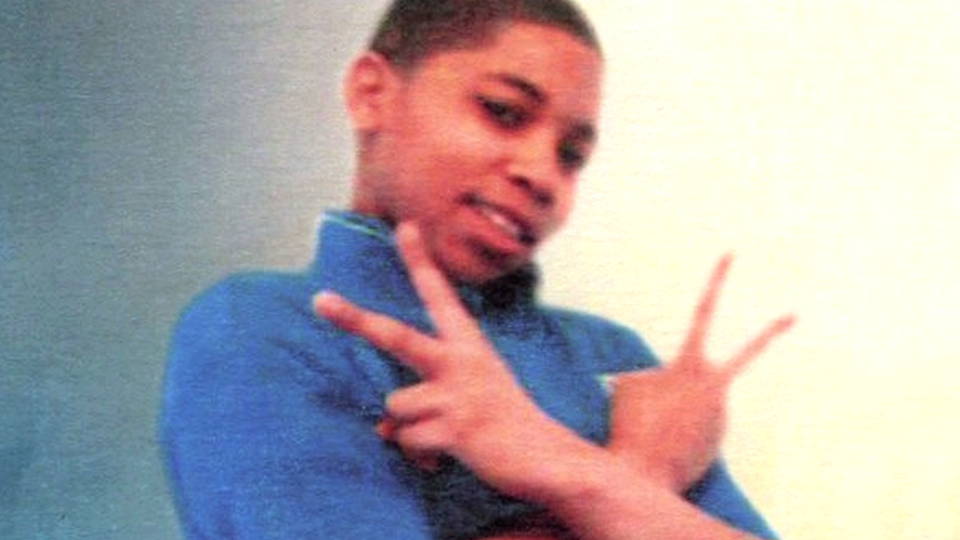
Cleveland, Ohio, officials have agreed to pay $6 million to settle a lawsuit filed by the family of Tamir Rice. The African-American 12-year-old was fatally shot by police in 2014 while playing with a toy pellet gun in a Cleveland park. A 911 caller reported seeing him with a weapon but noted it was "probably fake"—that information was not relayed to the responding officers. Officer Timothy Loehmann shot Tamir within two seconds of arriving at the scene. Neither Loehmann nor his partner, Frank Garmback, administered any first aid. When Tamir’s 14-year-old sister rushed to her brother’s side, they tackled her to the ground, handcuffed her and put her in the cruiser. Tamir died the next day. Last year, a grand jury failed to bring charges against either of the officers. Cleveland Mayor Frank Jackson announced the payout, which is likely the largest ever for the city in a police-related case.
Mayor Frank Jackson: "And while we have settled the legal side of this and the court proceeding side of this for $6 million, there is no price that you can put on the life, of the loss of a 12-year-old child."
After the settlement was announced, the head of the police union, Stephen Loomis, sparked controversy by suggesting the Rice family use part of the money to "help educate the youth of Cleveland in the dangers associated with the mishandling of both real and facsimile firearms." We’ll speak with an attorney for Tamir Rice’s family and a Black Lives Matter organizer after headlines.
TOPICS:
Black Lives Matter
Police Brutality
Ohio
Voters Head to Polls in 5 States for "Acela Primary"
Voters head to the polls today in Connecticut, Delaware, Maryland, Pennsylvania and Rhode Island for the so-called Acela primary, nicknamed for the high-speed Amtrak train that runs through the states. On the Republican side, the primaries come after Ohio Governor John Kasich and Texas Senator Ted Cruz announced plans to coordinate to defeat Donald Trump in three upcoming states, though the alliance appears to be unraveling already. Cruz’s campaign has said it will focus on the May 3 primary in Indiana in order to allow Kasich to compete with Trump in Oregon and here in New Mexico. Trump mocked the alliance—and his rivals—at a stop in Warwick, Rhode Island.
Donald Trump: "In politics, because it’s a rigged system, because it’s a corrupt enterprise, in politics you’re allowed to collude. So they colluded, and actually I was happy, because it shows how weak they are. It shows how pathetic they are. ... Now, you look at Kasich. I don’t think he knows what—you know, did you see him? He has a news conference all the time when he’s eating. I have never seen a human being eat in such a disgusting fashion."
TOPICS:
2016 Election
Ted Cruz
Donald Trump
Republican Party
Pollster: Sanders Is "Moving a Generation to the Left"

Democratic candidate Bernie Sanders rallied voters in Pittsburgh, Pennsylvania, Monday, saying he could triumph in today’s contests if voter turnout is high.
Sen. Bernie Sanders: "All over this country, what we have found is that when voter turnout is high, we do very well. And I believe that if there is a high voter turnout tomorrow, we’re going to win here in Pennsylvania."
A new survey from Harvard University’s Institute of Politics shows Sanders remains the most popular candidate among young people between 18 and 29. Polling director John Della Volpe told The Washington Post, "He’s not moving a party to the left. He’s moving a generation to the left." Democratic rival Hillary Clinton meanwhile took aim at Republican front-runner Donald Trump during a campaign stop in Wilmington, Delaware.
Hillary Clinton: "So, Donald Trump says wages are too high in America, and he doesn’t support raising the minimum wage. And I have said, 'Come out of those towers named for yourself, and actually talk and listen to people.'"
TOPICS:
2016 Election
Democratic Party
Bernie Sanders
Hillary Clinton
Trump & Clinton Share Delaware Address Known for Tax Loophole
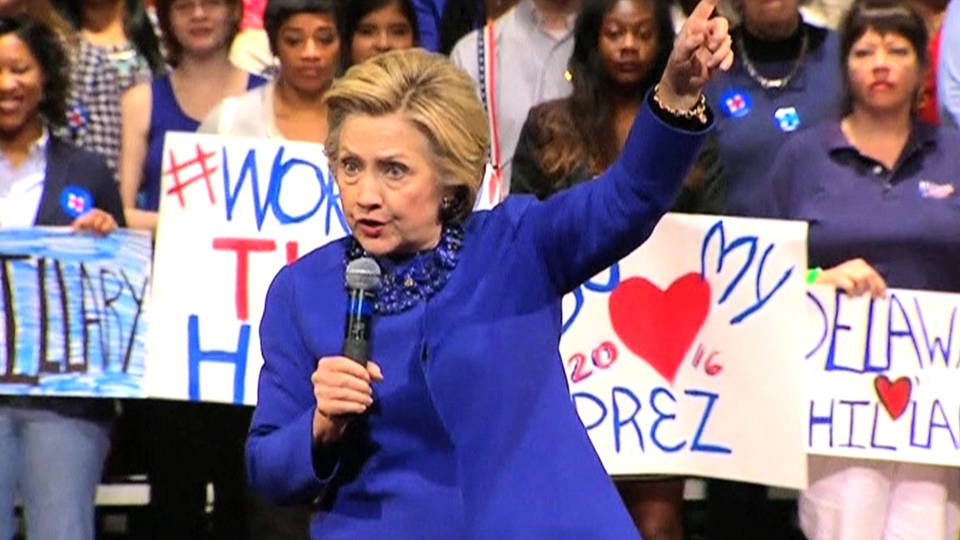
Clinton and Trump share one thing in common in Delaware: an address known for helping companies avoid hundreds of millions of dollars in taxes. The Guardian reports the two-story office building in Wilmington is the registered address of more than 285,000 companies, more than any other address in the world. By registering in Delaware, companies can avoid taxes by shifting earnings from other states. Clinton and Trump both have companies registered at the address, and both have refused to explain why.
TOPICS:
Hillary Clinton
Donald Trump
Tax Havens
Billionaire Environmentalist Tom Steyer Pledges $25 Million to Spur Youth Vote
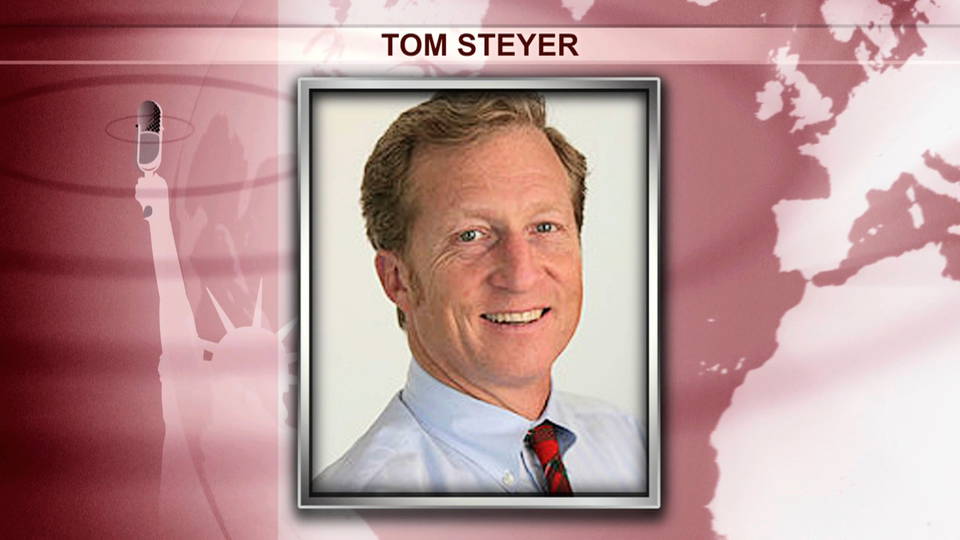
Billionaire environmentalist Tom Steyer has announced his super PAC will spend at least $25 million to mobilize young people to vote. The outreach campaign will focus on the swing states of Ohio, Pennsylvania, Iowa, Colorado, Nevada, New Hampshire and Illinois. Steyer was the single largest political donor of the 2014 midterm election cycle, spending $74 million to support Democrats through his super PAC, NextGen Climate Action. He is the biggest super PAC donor of 2016 to date.
TOPICS:
2016 Election
Campaign Finance
Judge Upholds Sweeping North Carolina Voting Restrictions
A federal judge has upheld sweeping voting restrictions in North Carolina, which could be a key swing state in the November election. The ruling upholds North Carolina’s requirement of a photo ID to vote, as well as a week-long cut in early voting and restrictions barring people from registering and voting on the same day or from registering before their 18th birthday. Critics vowed to continue protesting the rules, which they say disproportionately impact African Americans, Latinos and the elderly.
TOPICS:
North Carolina
Voting
More Than 50 Arrested Protesting North Carolina's Anti-LGBT Law
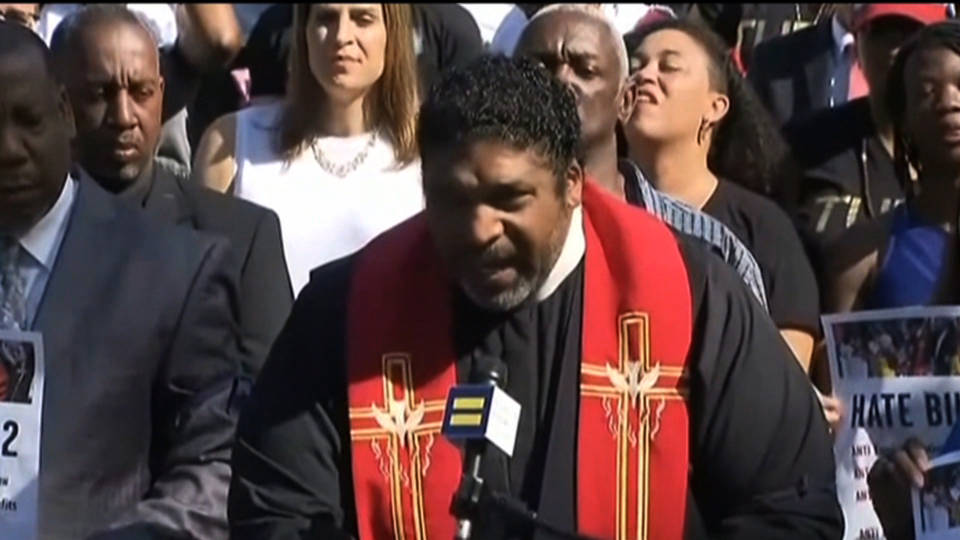
More than 50 people were arrested at the North Carolina state House Monday night, protesting the state’s new anti-transgender law. The law bars transgender people from using the bathroom that corresponds to their gender identity, and nullifies local ordinances aimed at protecting LGBT people. Opponents delivered 187,000 signatures demanding a repeal. Reverend William Barber denounced the law, known as House Bill 2.
Rev. William Barber: "Hate Bill 2 is not a bathroom bill. It is not a bill to protect women and children from predators. It is a cynical attempt to pit supposedly Christian values against our families’ best interests and our faith’s highest morality."
TOPICS:
North Carolina
LGBT
Demi Lovato, Nick Jonas Cancel Shows in North Carolina over Anti-LGBT Law
Meanwhile, corporations and entertainers have continued to join the national outcry against HB 2. Demi Lovato and Nick Jonas have become the latest musicians to cancel shows to protest the anti-transgender law.
TOPICS:
North Carolina
LGBT
Bangladesh: Gay Rights Activist Hacked to Death in Dhaka
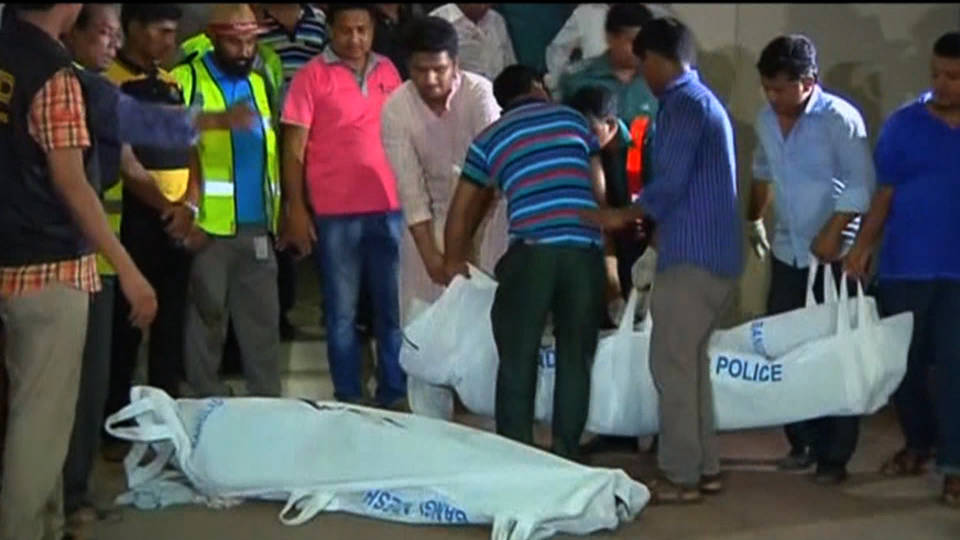
In Bangladesh, a gay rights activist has been hacked to death in the capital Dhaka. Julhas Mannan was the editor of Bangladesh’s only LGBT magazine. He was murdered alongside another man by a group of five or six attackers wielding machetes. The killing comes just days after a university professor was also hacked to death.
TOPICS:
Bangladesh
LGBT
Canadian Man Beheaded by Militants in the Philippines
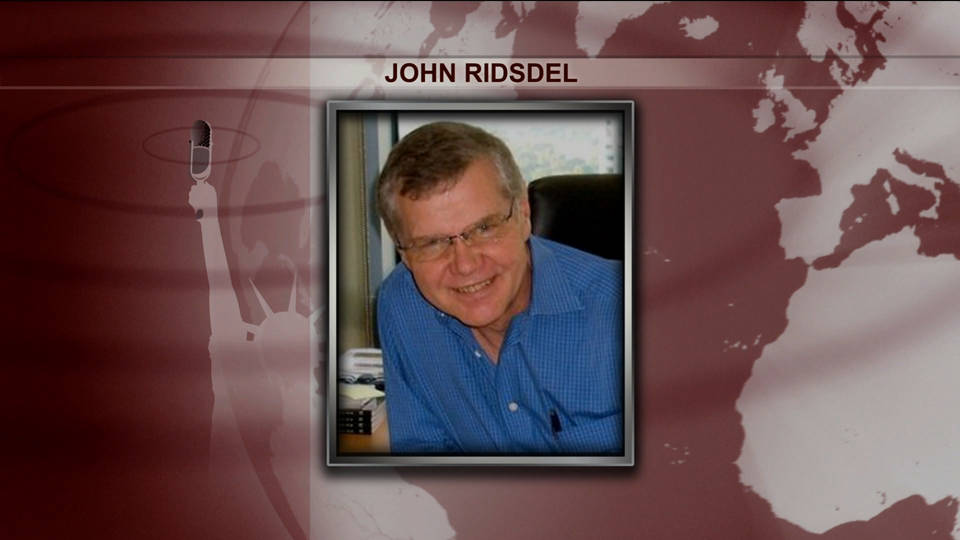
A Canadian man held hostage by militants in the Philippines has been beheaded. John Ridsdel was captured six months ago by the group Abu Sayyaf, which executed him after a ransom deadline passed. Canadian Prime Minister Justin Trudeau condemned the killing.
Prime Minister Justin Trudeau: "This was an act of cold-blooded murder, and responsibility rests squarely with the terrorist group who took him hostage. The government of Canada is committed to working with the government of Philippines and international partners to pursue those responsible for this heinous act and bring them to justice."
TOPICS:
Philippines
Canada
Court Lets Criminal Sexual Assault Case Against Bill Cosby Move Ahead
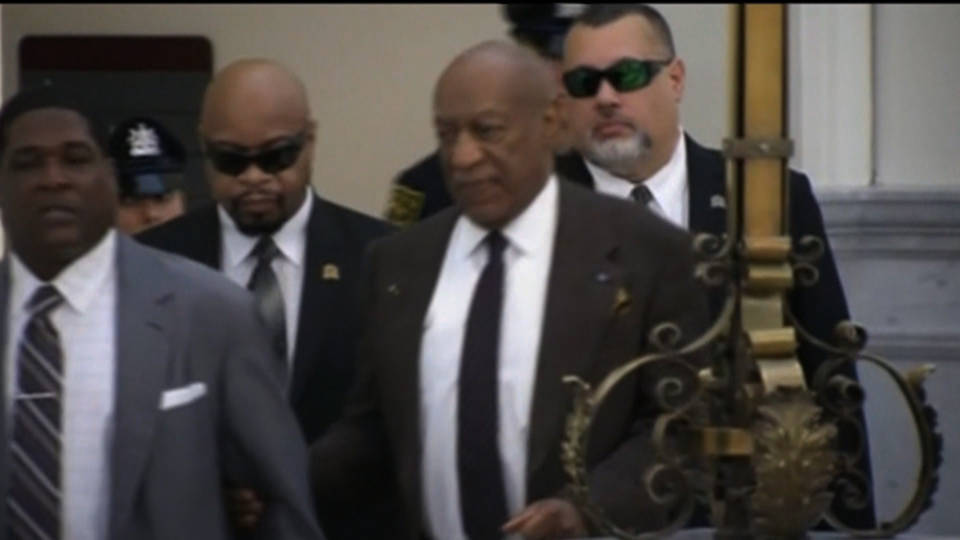
A Pennsylvania appeals court has paved the way for a criminal sexual assault case against Bill Cosby to move forward. The court dismissed Cosby’s bid to have the charges thrown out in a case involving Andrea Constand, who says Cosby drugged and assaulted her in 2004. More than 50 women have come forward to accuse Cosby of sexual assaults dating back decades.
TOPICS:
Sexual Assault
Australian MP Sets River on Fire to Protest Fracking
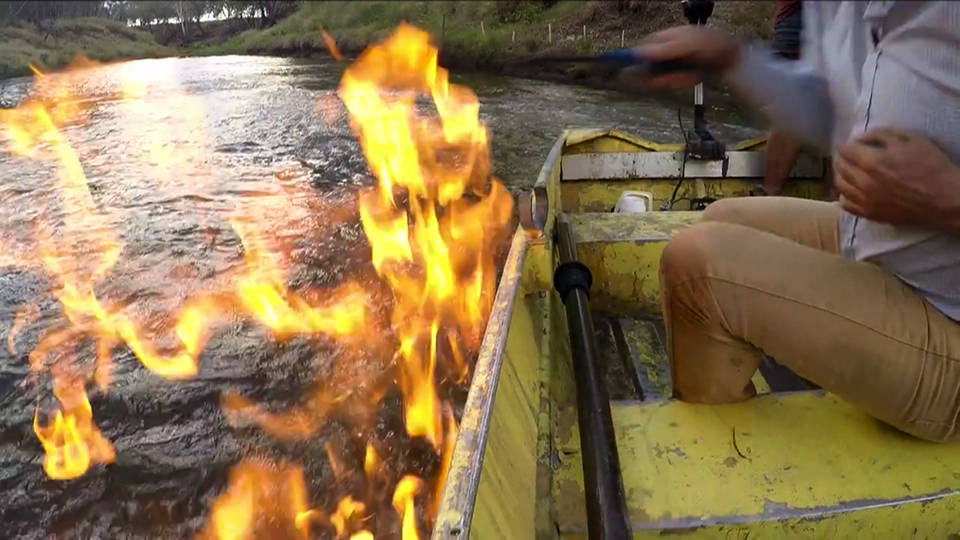
An Australian politician has set a river on fire to protest the gas drilling technique known as fracking. Video shows Green Party MP Jeremy Buckingham leaning out of a small boat and setting the river in Queensland ablaze with a lighter.
Jeremy Buckingham: "Sometimes a picture says a thousand words. Have a look at this: the Condamine River in South West Queensland on fire, the fracking just a kilometer away, methane coming up, and now the river is alight. Unbelievable, the most incredible thing I’ve seen, a tragedy in the Murray-Darling Basin. This is the future of Australia if we do not stop the frackers who want to spread across all states and territories and do this to your community."
TOPICS:
Australia
Fracking
Environment
Ukraine Marks 30th Anniversary of Chernobyl, World's Worst Nuclear Disaster
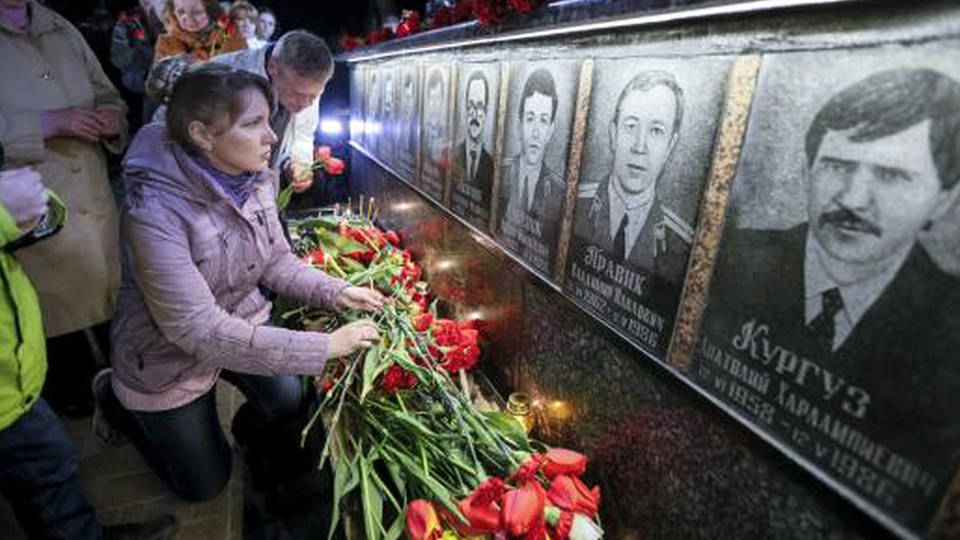
And Ukraine is holding commemorations today to mark the 30th anniversary of the worst nuclear disaster in history. The meltdown at the Chernobyl plant sent a cloud of radioactive fallout into Russia, Belarus and over a large portion of Europe. A vast rural region became uninhabitable, including the town of Pripyat, which remains abandoned. Lyudmila Kamkina, a former Chernobyl employee, spoke at a memorial ceremony in the Ukrainian capital Kiev.
Lyudmila Kamkina: "We did not think that this accident would change all our lives and our lives would be divided into 'before the war' and 'after the war,' as we called it. It was silent nuclear war for us, for those who lived there in Pripyat and who worked at the station."
We’ll have more on Chernobyl later in the broadcast.
TOPICS:
Nuclear Power
Donate today:
Follow:

4/26 Los Alamos, NM
4/26 Santa Fe, NM
4/27 Flagstaff, AZ
4/28 Phoenix, AZ
4/28 Tucson, AZ
4/29 Fresno, CA
4/30 San Mateo, CA
4/30 Grass Valley, CA
5/1 Houston, TX
5/1 New Orleans, LA
5/2 Sarasota, FL
5/3 Atlanta, GA
more
NEW BOOK

Broadcast Engineer
Director of Finance and Operations
WEB EXCLUSIVE

VIDEO: Spoken Word Artist Saul Williams Extended Interview on His New Album,MartyrLoserKing
207 West 25th Street, 11th Floor
New York, New York 10001, United States
---------------------
---------------------






No comments:
Post a Comment